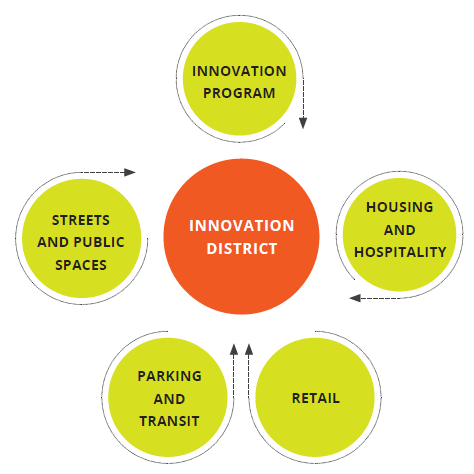Innovation and Entrepreneurship
 As Carolina’s culture of innovation has developed, innovation and entrepreneurship spaces have been primarily located in temporary spaces. The University and Town need clusters of innovation spaces to support ventures in each phase of growth to effectively translate scholarly activity into global impact.
As Carolina’s culture of innovation has developed, innovation and entrepreneurship spaces have been primarily located in temporary spaces. The University and Town need clusters of innovation spaces to support ventures in each phase of growth to effectively translate scholarly activity into global impact.
Innovate Carolina, Facilities Services, and Real Estate Operations collaborated during the preplanning process to envision how the University could better support the Town of Chapel Hill’s innovation ecosystem through physical space. Review of best practices nationwide affirmed that successful innovation districts are diverse, mixed-use environments that attract and retain talent, support new companies at each stage of growth, connect to neighboring communities, and embed capacity for physical expansion.
Companies require different support and space at each stage along the innovation pipeline. Within Chapel Hill’s ecosystem, incubation and acceleration space is limited, and almost no facilities are targeted at growing companies and corporate partners.
Based on an aspirational number of University-affiliated start-up companies, UNC-Chapel Hill could support nearly 200,000 gross square feet of space for early-stage companies, support services, and amenities within the next 10 years. While the space assessment addresses needs for University programs, this programmatic assessment offers a more in-depth understanding of space needs related to partnership goals.
Initial review of real estate opportunities reinforced that Franklin Street, Campus North, the medical center, and future expansion sites each present different assets to support the innovation ecosystem. The study identified opportunities on three time horizons. The University and Innovate Carolina advanced several immediate opportunities as a direct result of the process. Over the mid term, the study emphasized a focus on creating centralized hubs adjacent to major existing assets to supplement the dispersed ecosystem. In the long term, the study envisioned innovation and entrepreneurship as central components of the program for new redevelopment areas.
The Innovation Pipeline
 LearnWithin core teaching and research, UNC-Chapel Hill fosters the creation of new knowledge.
LearnWithin core teaching and research, UNC-Chapel Hill fosters the creation of new knowledge. Create and TestIndividuals and teams explore new ideas and their potential impact on the world.
Create and TestIndividuals and teams explore new ideas and their potential impact on the world. IncubateA single idea with broad potential impact is investigated.
IncubateA single idea with broad potential impact is investigated. AccelerateCompletion of a focused program builds promising ideas into companies.
AccelerateCompletion of a focused program builds promising ideas into companies. GrowEarly stage companies scale their vision, adding new employees and expanding impact.
GrowEarly stage companies scale their vision, adding new employees and expanding impact. PartnerMature companies establish mutually beneficial relationships with research universities.
PartnerMature companies establish mutually beneficial relationships with research universities.
Key Opportunity Areas
- Franklin Street Corridor, specifically through strategic redevelopment opportunities around Porthole Alley
- Science Complex, through renovation and infill development
- Campus South Hub, as part of mixed-use redevelopment over time
Existing and Planned Innovation Spaces
- Blue Stars: Co-working/Support Space
- Red Stars: Makerspace
Wet Lab Space
- Orange Circles: Facility Use Agreements – 2015
- Orange Stars: Other Existing Innovation Space
